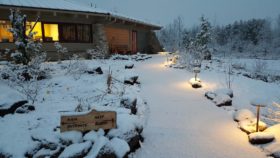
Crossroads at Big Creek was a part of the “messy garden movement” long before messy gardens became A Thing. Messiness supports our 2017 Educational Theme, “Location, Location, Location,” which focuses on wildlife habitats. Actually, we’ve never cleaned up the landscaping at the Collins Learning Center until true spring—meaning after at least least a couple days of 50 degree weather…. warm enough for our hibernating critters to awaken and emerge.
In “The Native Plant Herald”, the blog of Prairie Nursery, Neil Diboll, who [I’m so excited] will be the guest speaker at a Wild Ones program at Crossroads on November 16, wrote: “Creating a positive ecological impact in your garden can be as easy as letting go of excessive fall clean-up.
“We’ve all done it….prepared the garden for winter. Cut down, hauled off, raked clean or burned every bit of dead plant material in sight. Applying a rigorous cleaning at the end of the season is still commonplace, but it’s important to know that scraping the yard clean to make it “ready for winter” impacts the lives of countless garden occupants—butterflies, moths, bees, toads and others—who’s home and plant-centric existence are at the mercy of our industriousness.”
The Habitat Network, which is a collaboration of the Cornell Lab of Ornithology and The Nature Conservancy, published an article called, “The Wildlife Value of a Messy Garden” It states, “Gardens rich in shriveled fruits and abundant seed heads help migratory birds survive not only winter, but spring breeding.
The author, Becca Rodmosky-Bish, continues, “Here’s a secret not all gardeners know—if you choose to be a messy gardener in the fall and the winter—the wildlife value of your garden soars.”
That is so true. Even when our birdfeeders are filled, winter birds flock to the seed heads of sunflowers, black-eyed susans and asters. Birds hide in our tall grasses. They roost in our shrubs.
But messy landscapes are not just for the birds. Pollinators such as native bees and butterflies overwinter in dead plant material. Frogs and toads burrow in the loose soil. Small mammals depend on seeds and they, in turn, attract predators like foxes and birds of prey. Our messy Bird and Butterfly Garden supports a complete food web.
Admittedly, during a raw autumn rain, our spent garden plants look bedraggled, but with the first hard frost, the garden is magically transformed into a glittering wonderland. Flocked with delicate clumps of snow, flowers seem to bloom again in winter. Ornamental grasses sparkle as they sway in the winter wind. Supported by dead plants, snow forms an insulating blanket for the plants and animals living below, because even in the dead of winter, a messy garden is very much alive.
And after we fall back to standard time on Sunday, birders will again be able to enjoy their messy gardens and watch the birds during breakfast. Stargazers will still be awake when darkness reveals the evening stars.
On November 7, at 7:00 stargazers and amateur astronomers will gather at the Stonecipher Astronomy Center for the November Meeting of Door Peninsula Astronomical Society. Society President Gary Henkelmann will present the monthly mini program, ‘Basics in Astronomy”, discussing types of viewing targets. The lecture “ Processing Images” will be presented by Dave Lenius. Refreshments and good fellowship are a part of every meeting. Visitors are encouraged.
Crossroads is a donor-supported learning preserve, made up of The Cove, Big Creek, and Ida Bay preserves. The Collins Learning Center, located at 2041 Michigan, is open 2:00-4:30 daily and during scheduled eventer. The preserves and restrooms are open, free of charge, 24/7.
Thursday, November 2 6:00 Youth Mental Health Program
Youth mental health is a topic of growing concern across Wisconsin and the nation. A free program will feature a panel of mental health experts to help parents and community members understand the issues teenagers face. The program will be offered in the Lecture Hall of the Collins Learning Center from 6 p.m. to 7 p.m. but doors open at 5:30 p.m. with sandwiches and beverages provided..
The event is sponsored by the Door County Public Health’s Mental Health Focus Group and Door County Human Services. Four $25 Door County Visitor Center Gift Cards will be given away during the event. Lecture Hall of the Collins Learning Center.
Friday, November 3 2:00 Wisconsin Hometown Stories-Green Bay View the Wisconsin Public Television production of Wisconsin Hometown Stories: Green Bay follows the growth of the city at the mouth of the Fox River from its early days to the present. Free and open to the public. Lecture hall of the Collins Learning Center.
Tuesday, November 7 7:00 Meeting of the Door Peninsula Astronomical Society
Stargazers and amateur astronomers will gather at the Stonecipher Astronomy Center for the November meeting of Door Peninsula Astronomical Society. Society President Gary Henkelmann will present the monthly mini-program, Basics in Astronomy, discussing types of viewing targets. The lecture “Processing Images” will be presented by Dave Lenius. Refreshments and good fellowship are a part of every meeting. Visitors are encouraged.

